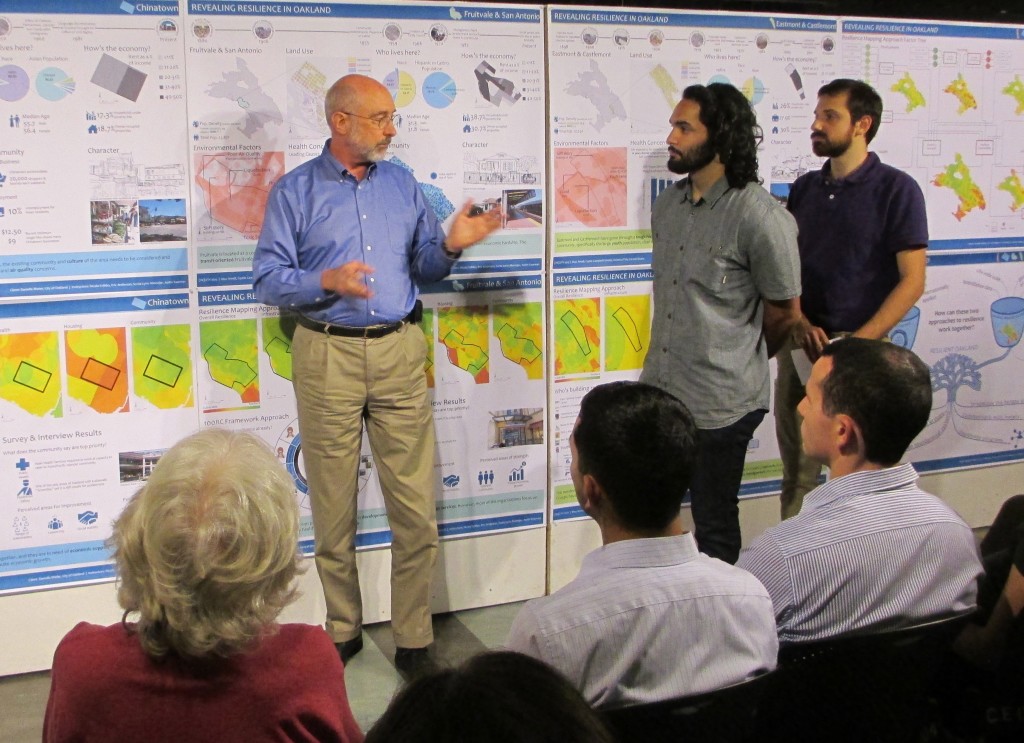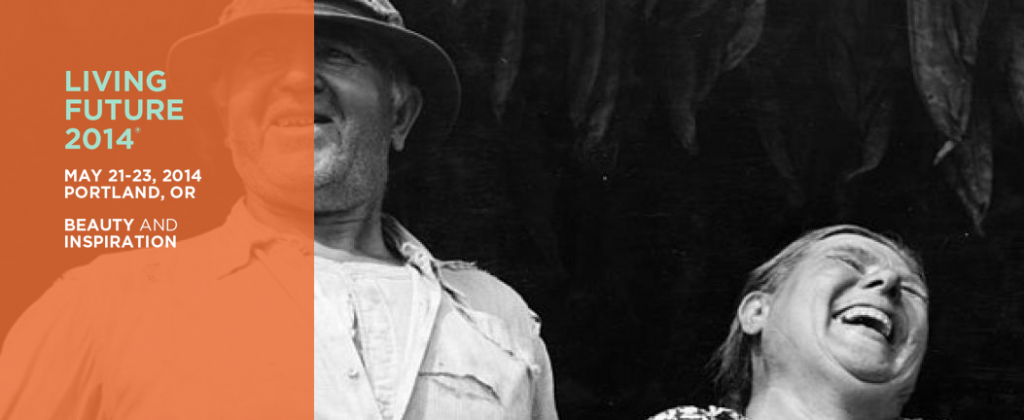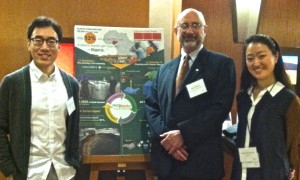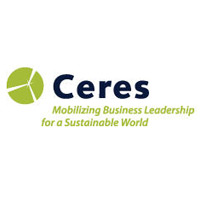Keynote Address at Real Estate Symposium
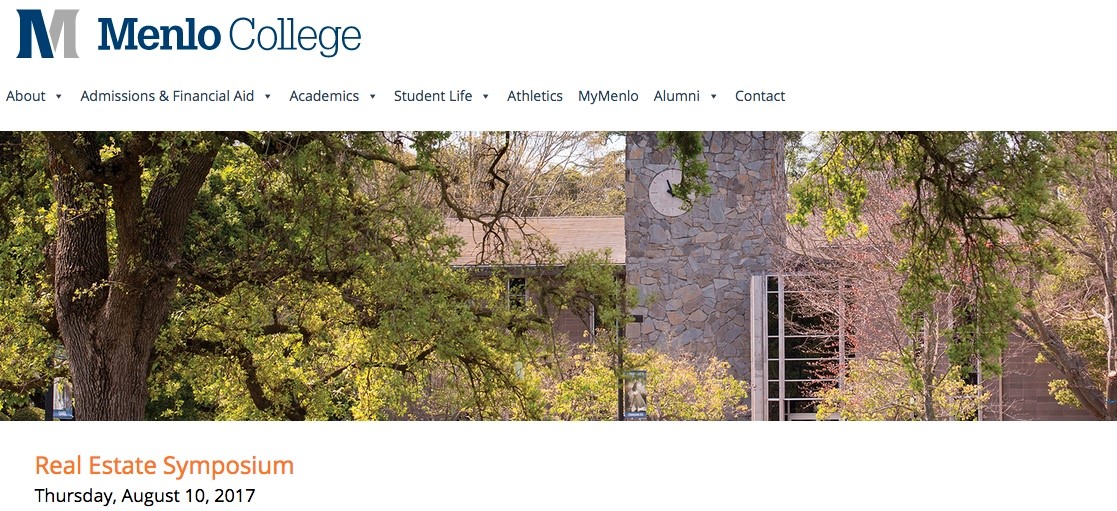
Institute Executive Director Ed Church gave the Keynote presentation at the annual Real Estate Symposium at Menlo College in Atherton, California on August 10, 2017. Titled “Changing Climate, Changing Real Estate,” his presentation outlined major issues for the built environment and our planet.
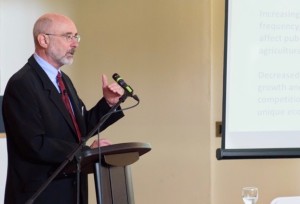 Because Menlo College is in Silicon Valley, Church spoke of “innovation: serving what we would or could do,” and contrasted it with climate change-driven “adaptation: serving what we must do.” Opportunity for real estate, as well as other business sectors lies at the intersection of the two.
Because Menlo College is in Silicon Valley, Church spoke of “innovation: serving what we would or could do,” and contrasted it with climate change-driven “adaptation: serving what we must do.” Opportunity for real estate, as well as other business sectors lies at the intersection of the two.
For an audience which frequently feels constrained by regulation and public policies, Church asserted that California climate regulations based on realistic appraisals of the need to reduce fossil fuel use give real estate professionals an advantage over areas of the country like the Southeast, who feel the brunt of climate change without acknowledging it with policies that can mitigate its effects. Church showed how, in California, regulations can create value and a level playing field for buildings and energy use.
[IN]CITY, the Summer [IN]STITUTE in Environmental Design
Each Summer, the UC Berkeley College of Environmental Design conducts the [IN]CITY program to provide non-planning students with introductory skills in urban planning and policy methods, including data collection/analysis, physical planning, mapping and visual representation. Students are introduced to land use policies and urban development processes and develop critical thinking, observation, and analysis regarding an understanding of cities. On August 12, 2015, for the second year, IEE Executive Director Ed Church was invited to critique the studio presentations.
Microgrids are the better solution for rebuilding energy infrastructure
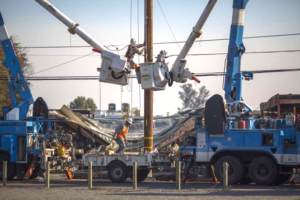
On October 30, 2017 the San Francisco Chronicle published a piece by IEE’s Ed Church about the opportunity to rebuild electricity infrastructure after the destructive fires in California’s Wine Country.
In the article, Church emphasized that local energy microgrids are more resilient in the face of service interruptions caused by natural events, including devastating fires and storms that have taken down utility infrastructure. They are also less vulnerable to hacking, and energy loss from long-distance transmission.
Judge at The Global Social Venture Competition

The Global Social Venture Competition (GSVC) empowers the next generation of social entrepreneurs by providing them with mentoring, exposure, and over $80,000 in prizes to transform their ideas into ventures that address the world’s most pressing challenges. Teams from across the globe learn how to design scalable models through a process that emphasizes stakeholder discovery, business innovation, and social impact assessment. IEE Executive Director Ed Church, previously a Mentor for the Competition, this year served as a Judge in the Regional round, held at the UC Berkeley Haas Business School on February 24, 2017.
Think Again Before Building Public Parking Garages
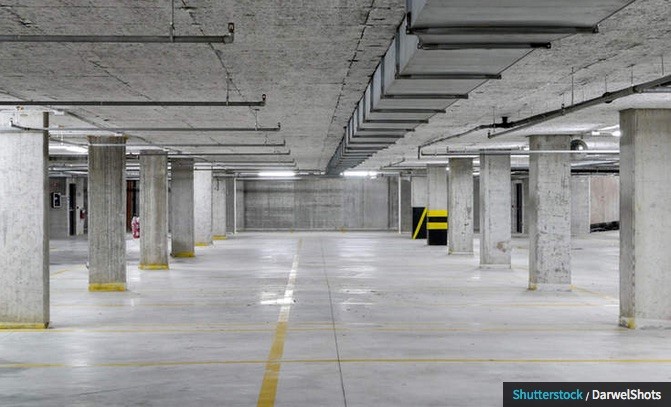
On November 21, 2016 GreenBiz published this piece by IEE Executive Director Ed Church. On New Year’s Day, 2017, the San Francisco Chronicle’s Sunday Insight Section led off its articles called “2017 and Beyond” with a version, called Don’t Build Parking Garages – They Won’t Be Necessary. They are excerpted below.
Three significant pressures are aligning which should give pause to investors in automobile parking garages. Garages are typically financed on a 30-year payback, either by cities or private investors. But they could find themselves holding the un-payable back-end of a 30-year note, when folks stop driving within the next 15 years.
The first pressure, already underway, is from Millennials simply not interested in driving. In part, this is based in the embracing of social media connectivity that makes connectivity via car unnecessary or burdensome. With fewer drivers’ licenses and auto purchases among young adults comes decreased need for that parking garage space.
The second pressure is the technological advancement toward autonomous vehicles. As these vehicles are converted into “robot taxis” which can be hailed with a tap on a cell phone app, the need for ownership of personal cars will decline, taking with it the need for parking space.
The third pressure, greatest of all, is the move away from fossil-fuel burning automobiles. These will simply be phased-out.
Adapting to Adaptation: A Road Map to How We Will Live in 2050

How to know where climate change leads us? Climate scientists have discovered, and elaborately described, dramatic changes in the Earth’s climate which will effect us all. Chemists, biologists and other scientists have joined with physicists and meteorologists in the next phase of the endeavor, projecting the effects of climate change on our planet.
What follows from those predictions are proposals for physical counter-measures to lessen or adapt to the effects. But, what happens after we take those counter-measures, mostly centered on ending our use of fossil fuels? Those adaptations will change the way we live.
The longer-term realities will be living with the disruptions of adaptations necessitated by climate change: adapting to adaptation.
This is the full text of the piece written by IEE Executive Director Ed Church and published by Meeting of the Minds. It synthesizes information from business, governments and start-ups to begin the discussion on how we will live in 2050.
Water and Housing: How to Have Both
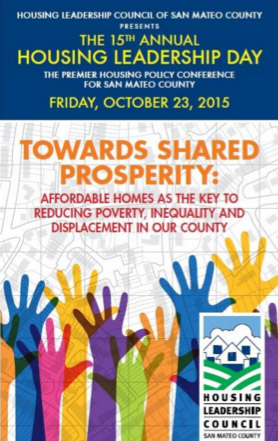
At the 15th Annual Housing Leadership Day at the College of San Mateo, IEE Executive Director Ed Church participated on an expert panel discussing the nexus of water and housing, with Richard Luthy, Professor of Civil and Environmental Engineering at Stanford University and Senior Fellow in the Woods Institute for the Environment of Stanford, and Nicole Sandkulla, CEO of the Bay Area Water Supply and Conservation Agency.
They explored methods for constructing new, multi-family housing to address the Bay Area housing shortage, along with new technologies to dramatically reduce the per capita use of water. Adrienne Etherton of Sustainable San Mateo County moderated.
New Industry Opportunities in Renewable Finance
 January 28-29, 2015, this conference, held at the TopLine Accelerator in Richmond, CA brought together thought leaders in the Renewable Energy Finance, International Solar Development, Cleantech, Commercial Solar Finance & Renewable Investments.
January 28-29, 2015, this conference, held at the TopLine Accelerator in Richmond, CA brought together thought leaders in the Renewable Energy Finance, International Solar Development, Cleantech, Commercial Solar Finance & Renewable Investments.
IEE Executive Director Ed Church was one of the featured speakers on a panel with cleantech investors, about the connection between finance, public policy and net-zero technologies.
Federal Reserve Bay Area Economic Forecast Panel
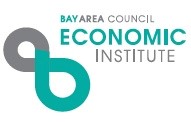

The 8th Annual Bay Area Economic Forecast was presented by the Bay Area Council’s Economic Institute at the Federal Reserve Bank of San Francisco on January 16, 2015. The event featured remarks by the Fed’s President, John Williams, by BAC VP Tracey Grose, Mary Hamilton of Accenture and Jerry Nickelsburg of UCLA Anderson Forecast.
IEE’s Executive Director Ed Church was part of a panel commenting on the forecasts. With other panelists from the City of San Jose, Qualcomm and Microsoft, he addressed the question of smart cities and data from the lens of transitioning to the post-carbon society.
Community Design for Healthy Habits
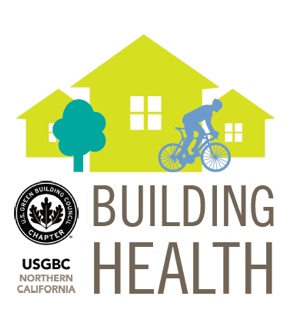 The Northern California Chapter of the US Green Building Council held its conference on Building Health December 11, 2014 at the University of California, San Francisco’s Mission Bay Center. IEE Director Edward Church moderated the panel on Community Design for Healthy Habits.
The Northern California Chapter of the US Green Building Council held its conference on Building Health December 11, 2014 at the University of California, San Francisco’s Mission Bay Center. IEE Director Edward Church moderated the panel on Community Design for Healthy Habits.
The panel discussed how walking is not “alternative transportation,” it is primary transportation! Walking and other movement also promotes better thinking and creativity. But much of our urban design is based on removing these basic processes from our everyday lives. The session gave participants concrete examples of design and behavioral changes in diverse communities to be able to walk more and move more.
Presentation at International Living Future Conference
At the International Living Future Conference in Portland, Oregon in May of 2014, IEE Executive Director Ed Church made a presentation on removing the financial, regulatory and behavioral barriers to life-affirming (“biophilic”) design in the built environment. Ed’s presentation showed how the human systems which determine how and what we build are self-reinforcing. Conventionally, that means building the environmentally and socially unsustainable which will not serve us in the decades to come. He offered practical examples of emerging changes in finance and planning that can encourage a built environment that reduces energy and water, while enhancing human life.
Global Social Entrepreneurship Competition 2014
The Grand Hyatt Hotel in Seattle was the site of the celebration for the University of Washington’s Global Social Entrepreneurship Competition. Members of the RecoPlastic team, mentored by IEE’s Ed Church, were feted along with other finalists. The team of graduate students from MIT has developed a more environmentally-friendly and socially beneficial way to recycle plastic, in Lagos, Nigeria. Following the ceremony, two of the team members went back to Cambridge, MA for classes, and the third sped off to Lagos to set up operations.
Ecocity World Summit in Nantes, France
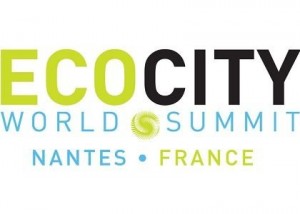 The Ecocity World Summit was held in Nantes, France at the end of September, 2013. Organized by the NGO Ecocity Builders, the week-long event was designed to facilitate exchanges among local, regional and governmental decision-makers, researchers and the civil society, and bring together all the different disciplines on sustainable cities.
The Ecocity World Summit was held in Nantes, France at the end of September, 2013. Organized by the NGO Ecocity Builders, the week-long event was designed to facilitate exchanges among local, regional and governmental decision-makers, researchers and the civil society, and bring together all the different disciplines on sustainable cities.
IEE Executive Director Ed Church was asked to make a presentation at the conference, based on some of the findings of the research we did for Arup, called the Cities and People Project. Although unable to attend, Ed made the presentation via video.
Building Tomorrow: Investing in Smart Infrastructure
Climate change, extreme weather and depleting natural resources are forcing communities to rethink and rebuild critical infrastructure like water services, energy systems, and public transportation. Infrastructure investment has the potential to both provide sound returns for investors as well as create jobs and ensure a more sustainable world for future generations. How are innovative investors and companies making these investments within the current economic and political climate? What are the barriers to increased green infrastructure investment? In May, IEE Executive Director Ed Church joined featured panelists at the 2013 Ceres Conference to address these important questions and discuss how current success stories can be replicated and scaled.
Judge and Mentor at Social Entrepreneurship Competitions
 This spring, IEE Executive Director Ed Church served as a Mentor for the Global Social Venture Competition at the UC Berkeley Haas School of Business, mentoring a Team from the India School of Business via email and Skype. GSVC is a student-run competition to launch the next generation of social enterprise entrepreneurs. GSVC provides aspiring entrepreneurs with mentoring, exposure, and $50,000 in prizes to transform their ideas into businesses with real-world impact. This unique competition connects promising social enterprises to the social impact investment community. Through eight regional partners and six outreach partners, GSVC attracts a diverse group of entrants from around the world.
This spring, IEE Executive Director Ed Church served as a Mentor for the Global Social Venture Competition at the UC Berkeley Haas School of Business, mentoring a Team from the India School of Business via email and Skype. GSVC is a student-run competition to launch the next generation of social enterprise entrepreneurs. GSVC provides aspiring entrepreneurs with mentoring, exposure, and $50,000 in prizes to transform their ideas into businesses with real-world impact. This unique competition connects promising social enterprises to the social impact investment community. Through eight regional partners and six outreach partners, GSVC attracts a diverse group of entrants from around the world.
Stanford University Social Entrepreneurship Challenge
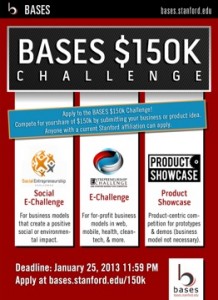 BASES, the Business Association of Stanford Entrepreneurial Students, annually sponsors the Social Entrepreneurship Challenge, which awards a total of $50,000 to teams with exceptional business models that generate positive social impact. In addition, teams receive mentoring from experts in social-impact funding, legal issues, and social entrepreneurship. For the third year, in 2016, IEE Executive Director Ed Church was a judge for the Challenge. Judges included venture capitalists, start-up experts and nonprofit leaders.
BASES, the Business Association of Stanford Entrepreneurial Students, annually sponsors the Social Entrepreneurship Challenge, which awards a total of $50,000 to teams with exceptional business models that generate positive social impact. In addition, teams receive mentoring from experts in social-impact funding, legal issues, and social entrepreneurship. For the third year, in 2016, IEE Executive Director Ed Church was a judge for the Challenge. Judges included venture capitalists, start-up experts and nonprofit leaders.
Review of Eco-Doom Books Gets Wider Audience
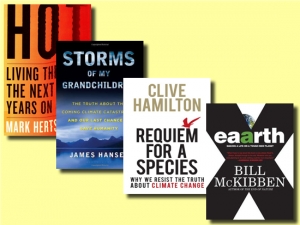 In January 2013, GreenBiz.com—a leading source of news and opinion on business and the environment, published IEE’s new four-book review called “Learning from the Eco Doom Books.” See the article here.
In January 2013, GreenBiz.com—a leading source of news and opinion on business and the environment, published IEE’s new four-book review called “Learning from the Eco Doom Books.” See the article here.
For this review, our staff chose four important books on the topic of climate change and global warming to compare and contrast themes, causes, different remedies and solutions, and predictions that each author puts forth. We think that we can collectively create a discipline of “sustainability” by making better use of what’s already out there. This review is an example.
EPA Fellowship Guidance
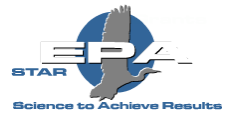 Each year, the U.S. Environmental Protection Agency (EPA) awards prestigious Fellowships for Graduate Environmental Study under the Science to Achieve Results (STAR) program. Fellowships of up to $126,000 are awarded through the National Center for Environmental Research. This February, Ed Church, IEE Executive Director, was one of the Peer Reviewers consulting on selection of STAR finalists in Washington, D.C.
Each year, the U.S. Environmental Protection Agency (EPA) awards prestigious Fellowships for Graduate Environmental Study under the Science to Achieve Results (STAR) program. Fellowships of up to $126,000 are awarded through the National Center for Environmental Research. This February, Ed Church, IEE Executive Director, was one of the Peer Reviewers consulting on selection of STAR finalists in Washington, D.C.
Reviewers evaluated applicants on their potential for success in an environmental graduate study program. The program engages the nation’s best scientists and engineers in targeted research that complements EPA’s own outstanding intramural research program. Ed was one of the few consultants from the Western U.S..
IEE Hosts UN Environment Programme Director
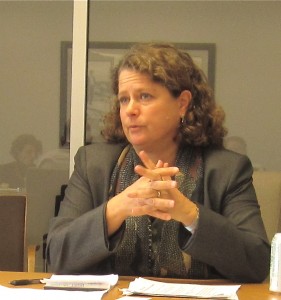 On November 15, 2011, Amy Fraenkel, the Director and Regional Representative of the United Nations Environment Program (UNEP), presented at a meeting organized by the Institute for Environmental Entrepreneurship and co-hosted by IEE partner ARUP at their San Francisco office. Ms. Fraenkel was there to engage with, and give information to, Bay Area businesses about the upcoming Rio+20 event.
On November 15, 2011, Amy Fraenkel, the Director and Regional Representative of the United Nations Environment Program (UNEP), presented at a meeting organized by the Institute for Environmental Entrepreneurship and co-hosted by IEE partner ARUP at their San Francisco office. Ms. Fraenkel was there to engage with, and give information to, Bay Area businesses about the upcoming Rio+20 event.
Next year marks the 20th anniversary of the historic 1992 Earth Summit. In light of this historic event, the United Nations Conference on Sustainable Development (also known as Rio+20) will take place in Rio de Janeiro next June. The Conference seeks to: 1) re-invigorate political support for sustainable development, 2) look back and assess the progress to date, and 3) tackle emerging issues that have reached their “tipping points” such as food security and water. The Conference is also particularly focused on the creation of a Green Economy.
Ed Church, Executive Director of IEE, and Aidan Hughes, a Principal at Arup, convened the meeting, attended by representatives from PG&E, financial services, the Sustainable Business Alliance, Sustainable Industries magazine, and others. Ms. Fraenkel was especially interested in connecting with Bay Area businesses since much innovative thinking begins in the Bay Area, and thus it is critical to include the West Coast in the discussion.
Overall, the meeting brought together a range of people engaged in sustainable business and built a potentially long-lasting connection between UNEP and Bay Area green business experts.
It was one outcome of the process begun last November when Ed chaired and IEE staffed a Working Group to give input to the Conference.
Architecture and Our Sustainable Future
IEE Executive Director Edward Church was a panelist at the 9th annual Architecture and the City Festival, the nation’s largest architectural festival. The theme for 2011 is “Architecture of Consequence,” which hopes to demonstrate how progressive design and creative problem solving can address society’s current challenges and lead to a more sustainable future.
Dr. Church spoke on a panel about “Communities of the Future,” which examined how increased demands for water, food, energy and recreational space are shaping contemporary architecture.
Exploring Career Opportunities in Triple Bottom Line Finance
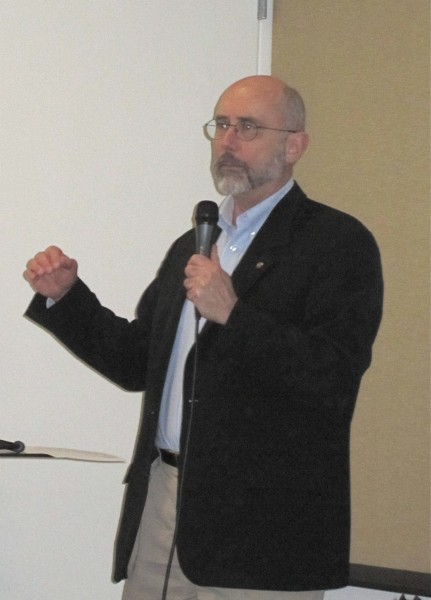 Where are the emerging career opportunities in triple bottom line finance?
Where are the emerging career opportunities in triple bottom line finance?
Executive Director Ed Church offered some of the answers on a panel with RSF Social Finance President Don Shaffer and New Resource Bank VP Bill Peterson, January 23, 2011 at the David Brower Center. They spoke at the Progressive Opportunities Career Fair, organized by the East Bay Express newspaper. The panel spoke to a standing-room-only crowd at an event attended by hundreds of people.
Both RSF and New Resource provide loans to businesses whose products and services help to achieve environmental and social, as well as financial returns. Ed spoke of the newly emerging field of “impact investing,” which can generate these triple bottom line results. Impact investing goes beyond the relatively well known approach called socially responsible investing. SRI uses investment screens to avoid companies that produce things the investor regards as harmful, but impact investing seeks to invest in companies whose products or services make the world a better place. All three speakers asserted that, as impact investing increases in popularity, career opportunities will follow.
IEE Director Speaks at SoCap
 IEE Executive Director Ed Church spoke at the Social Capital Markets conference held in October 2010 in San Francisco. Also known as SoCap10, it is an annual conference that attracts 1400 people from 40 countries. He was asked to speak as part of the learning track called Food Systems, on a panel devoted to “Creative Financing: Lessons Learned.”
IEE Executive Director Ed Church spoke at the Social Capital Markets conference held in October 2010 in San Francisco. Also known as SoCap10, it is an annual conference that attracts 1400 people from 40 countries. He was asked to speak as part of the learning track called Food Systems, on a panel devoted to “Creative Financing: Lessons Learned.”
SoCap is a multi-platform organization dedicated to the flow of capital towards social good. Their conferences connect leading global innovators – investors, foundations, institutions, and social entrepreneurs – to build this market at the intersection of money and meaning.

